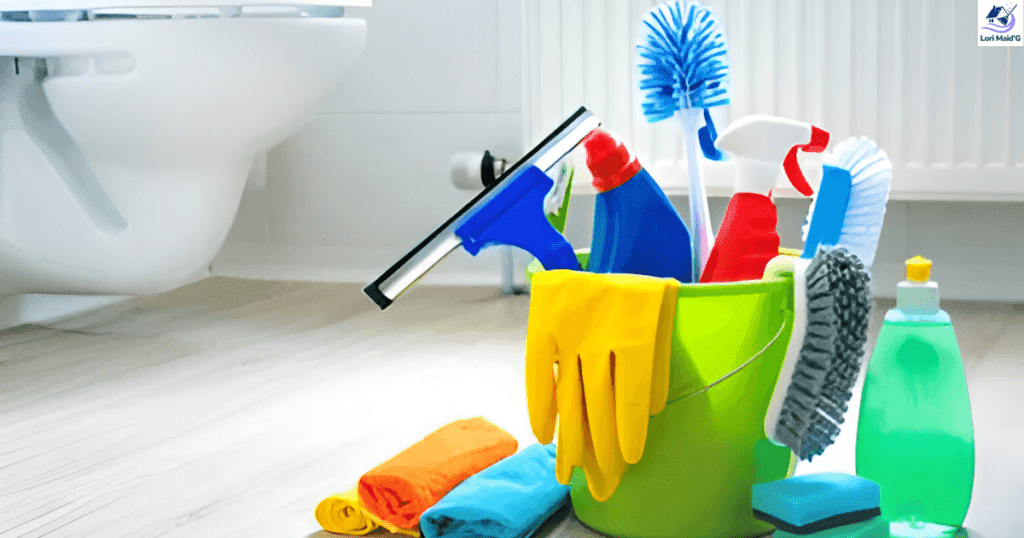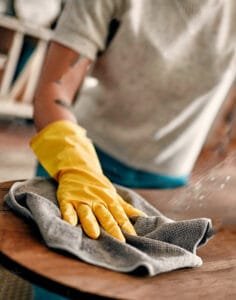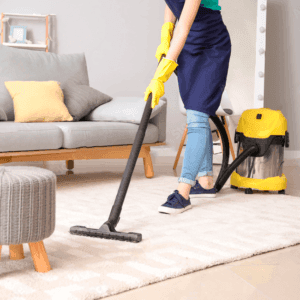When it comes to cleaning, we often reach for whatever product is closest, hoping it’ll get the job done. But is it safe and effective to use bathroom cleaner in your kitchen? Both spaces are vital for maintaining a healthy home, but they require different approaches due to the nature of the areas and the kinds of dirt and grime involved.
Let’s break down the differences between bathroom and kitchen cleaners, whether it’s okay to use them mutually, and the best practices for keeping your kitchen spotless.
The Main Differences Between Kitchen and Bathroom Cleaners
1. Bathroom Cleaners:
- Designed to fight soap scum, mold, and mildew.
- Often contains stronger chemicals like bleach or ammonia.
- Effective on non porous surfaces like tiles and porcelain but may damage or leave residues on kitchen countertops.
2. Kitchen Cleaners:
- Specifically formulated to cut through grease, oil, and food stains.
- Many kitchen cleaners are safe for surfaces that come into contact with food, making them a better choice for countertops, stoves, and cutting boards.
- Some kitchen cleaners are also designed to disinfect, killing bacteria without leaving behind harmful chemicals.
Read More: How to Get Rid of Mold on the Bathroom Ceiling
The Importance of Choosing the Right Cleaner

Every room in your house has its own unique cleaning needs. For example, your bathroom sees a lot of moisture, which can lead to mold and mildew, while your kitchen is prone to grease and food-related messes.
Bathroom cleaners are specially designed to tackle soap scum, mold, mildew, and hard water stains, but their composition may not be suitable for kitchen surfaces. Using the wrong type of cleaner can leave behind harsh chemicals that could be unsafe for food preparation areas.
Most bathroom cleaners contain ingredients that are effective for sanitizing toilets, sinks, and bathtubs, but these may be too abrasive or chemically intense for countertops, stoves, or other surfaces in your kitchen.
Some bathroom cleaners contain bleach, ammonia, or other strong chemicals that may not be food-safe. This means that even though the bathroom cleaner might work on stains and grease, it could potentially contaminate food surfaces with harmful chemicals.
Can You Use a Bathroom Cleaner in the Kitchen?
While you technically can use a bathroom cleaner in the kitchen in some situations, it’s not advisable. Bathroom cleaners are generally too harsh for kitchen surfaces and might not be safe for areas where you prepare food. Additionally, the strong fragrances and chemicals found in many bathroom cleaners can linger, potentially affecting the smell and taste of food.
If you find yourself in a pinch and absolutely need to use a bathroom cleaner on a kitchen surface, make sure to rinse the surface thoroughly afterward. Use plenty of water to wash away any chemical residue and ensure the surface is completely clean before placing food or dishes on it.
Risks of Using Bathroom Cleaners in the Kitchen

The kitchen is one of the most sensitive areas in the home because it’s where food is prepared, and cross contamination can lead to foodborne illnesses. Here are some risks of using bathroom cleaner in your kitchen:
1. Chemical Contamination:
The harsh chemicals in bathroom cleaners, such as bleach and ammonia, can leave behind residues that may be harmful if they come into contact with food or utensils.
2. Surface Damage:
Many kitchen surfaces are made from materials like granite, marble, or wood, which can be damaged by abrasive or acidic bathroom cleaners.
3. Unpleasant Odors:
Bathroom cleaners often have strong fragrances that can linger in the kitchen, potentially affecting the smell and taste of the food you’re preparing.
Read More: Easy and Effective Cleaning Tips to Get Stains Off Hardwood Floors
What Should You Use in the Kitchen?

Instead of reaching for a bathroom cleaner, opt for products specifically designed for kitchens. Many kitchen cleaners are formulated to clean grease, food stains, and bacteria effectively while being safe for food preparation surfaces.
1. All-Purpose Cleaners:
These are great for cleaning up everyday messes like spills and crumbs. Look for options labeled food-safe to ensure they won’t contaminate your kitchen.
2. Degreasers:
Kitchen cleaners often contain degreasing agents, which are essential for cutting through the buildup of cooking oils and fats.
3. Disinfectants:
For areas like cutting boards or countertops, where bacteria can linger, use a kitchen-specific disinfectant to eliminate harmful germs.
4. DIY Cleaning Solutions:
If you prefer a more natural cleaning approach, you can create your own kitchen cleaner using simple ingredients like vinegar and baking soda. These natural solutions are safe for most kitchen surfaces and won’t leave behind any harmful chemicals.
Professional Cleaning Services to the Rescue

If you’re unsure about which cleaners to use or simply don’t have the time to maintain a spotless kitchen, you can always rely on professionals to handle the job. Professional kitchen cleaning services by Lori Maid’G are equipped with the right products and knowledge to ensure your kitchen stays clean and safe.
When you take our residential kitchen cleaning services, you can rest easy knowing that trained professionals are using safe, effective products designed for your kitchen’s unique needs.
We know the best techniques to remove tough grease, eliminate bacteria, and leave your kitchen sparkling without risking chemical contamination.
Alternatively, if you’re looking for comprehensive cleaning for both your bathroom and kitchen, some companies offer both bathroom cleaning services and kitchen cleaning packages. This way, you can keep your entire home in top shape without worrying about the risks of using the wrong products in the wrong places.
Read More: Is My House Too Dirty for a Cleaning Service?
Conclusion
While bathroom cleaners may seem like a convenient option when you’re in a rush, it’s essential to think twice before using them in your kitchen. The chemicals and formulations designed for bathroom surfaces aren’t suitable for food preparation areas and can pose a risk to your family’s health. Instead, stick with kitchen-specific cleaners that are designed to handle grease, food stains, and bacteria safely.
By choosing the right products and following proper cleaning practices, you’ll maintain a clean and healthy kitchen. And if in doubt, you can always turn to professional kitchen cleaning services to ensure your home stays spotless without any risk.
In the end, using the right cleaner for the right job is not only about getting the best results but also about keeping your home safe and healthy for everyone.







